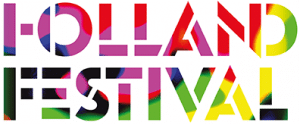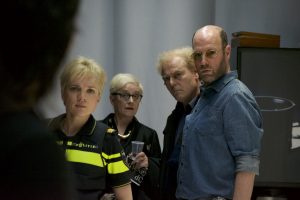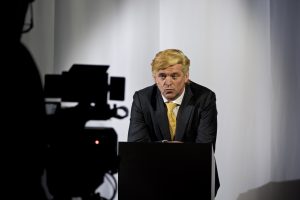 Netflix and HBO are now purveyors of our conversations with friends, family and colleagues. The ultimate icebreaker at a party with strangers is talking about series, about beloved characters. Is Jon Snow still alive? Where is Barb? After seeing the first two working performances of 'The Nation', I have a strong impression that I have found a fellow lover in Eric de Vroedt. A phone conversation a week later confirms that impression.
Netflix and HBO are now purveyors of our conversations with friends, family and colleagues. The ultimate icebreaker at a party with strangers is talking about series, about beloved characters. Is Jon Snow still alive? Where is Barb? After seeing the first two working performances of 'The Nation', I have a strong impression that I have found a fellow lover in Eric de Vroedt. A phone conversation a week later confirms that impression.
Bingewatching but different
The National Theatre has set itself the challenge of making 'the Nation' an addictive, six-part theatrical thriller. One not unlike a popular TV series. The quest of how to shape a series in theatre seems quite a challenge.
De Vroedt and consort opt for the experience of proximity. The actors sit between us, next to us, watching and speaking to us. This form is not 'new' (should it be?) but it works. At times, it feels as if you have 'stepped into' the series.
The clumsy, neat policeman on the outside, the folksy "that's how it's done here" colleague, the amiable businessman, the slick politician: they are all there, now archetypes in our contemporary serial landscape.
"The Hague is exciting"
De Vroedt could not have invented a better civic integration course for himself in The Hague than by making 'The Nation'. He spent months researching, walking with cops, caretakers, and exploring every street corner of the Schilderswijk. 'It's an exciting city' he says 'much more exciting than I thought'.
The opening gives a nice first impression of how The Hague has been put under a magnifying glass. A peerless trailer portrays the city as the bloodless menacing Washington from 'House of Cards'. Lights fade, statues loom menacingly into view and empty squeaky swings combined with a mysterious English-language title song complete the experience. The subject matter, a missing child, a Muslim boy and people with a lot of intersecting interests combine to form a miniature of the religious upheavals and misunderstandings that have engulfed our country in recent years.
Calling Eric
It is a strange moment to call, right after the commemoration of the dead. I have to shake off a somewhat charged and serene atmosphere to ask De Vroedt about his viewing and bingewatchbehaviour. And he is busy.
The three pre-summer performances will premiere at the Holland Festival. Parts four, five and six will follow after the summer. De Vroedt says this pressure cooker process makes him more reckless, faster. There is no time to endlessly talk things through or try ten ways. As a result, as a maker, you strike out in new directions that you hadn't thought of beforehand.
Yet he does not suddenly reject the more traditional way of working in Dutch theatre. "Funnily enough, this project made me appreciate more again the meticulousness and precision of eight weeks of rehearsing something," he says.

You don't expect it
Besides series like 'The Killing, the Bridge and House of Cards, there were very different genres in de Vroedt's viewing list. For instance, what about 'The Get Down' and 'The Crown' I ask him?
About 'The Crown' he does not have to think long. Two ' larger than life' characters facing each other, Churchill and Elizabeth, we have that too. With us in the form of an entrepreneur and a politician, although of course those characters are also based on stories from The Hague.
While writing part three, de Vroedt watched Baz Luhrman's 'The Get Down', about the genesis of hip-hop in the Bronx of the 1970s.'The Nation is nothing like the the Get Down. Not in subject matter or musicality. People really shouldn't think that. But still, the speed and musicality of that series subconsciously influenced me in writing a fast-mounted, perspective-changing finale for Part 3.'

Renaissance of theatre
'All those little stories together, tell the big story. Tell something about the complex globalised world we live in' states De Vroedt. This is exactly what appeals to him so much about current TV series. 'It all seems very plot-driven but you can talk about such complex processes and social dynamics.'
De Vroedt tells how in his time at drama school, plot had been declared dead. 'Plot, that was almost something ordinary, the less storyline the better we thought in those days. Through this process, I started to revalue plot.' Modestly and cautiously, he formulates a wish. ' 15, 20 years ago 'we' thought 'television' was dead, and now series are flourishing like never before. It is a true renaissance. Perhaps in theatre, in our own way and by our own means, we can also experience something like that again one day.'
‘'The Nation' can be seen at the Holland festival from 5 to 8 June 2017.
Click here for The National Theatre's playlist.
